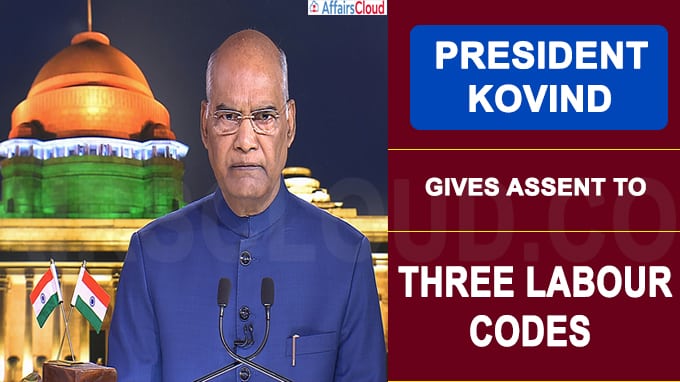
Now, in order to pacing the commitment further, on September 30, 2020, President Ram Nath Kovind has given his assent to the three labour codes viz. Code on Social Security 2020, the Occupational Safety, Health and Working Condition Code 2020, and the Industrial relation Code 2020.
- Now these three labour codes along with Code on Wages, 2019 will merge 29 central labour laws into four broader legislations including Factories Act, 1948, the Mines Act, 1952, the Employees State Insurance (ESI) Act, 1948, the Minimum Wage act, 1948, and Maternity Benefit Act, 1961, among others.
- The implementation of these four codes will be done after the labour ministry frames rules by the end of 2020.
Here are the key features of newly passed bills:
Industrial Relations Code, 2020
This new code was brought in by combining the features of three erstwhile laws — the Trade Unions Act, 1926, the Industrial Employment (Standing Orders) Act, 1946, and the Industrial Disputes Act, 1947 for hiring and firing of labour in mid-sized and large industries.
–Firing of labour: Under this companies with up to 300 workers are allowed to fire workers or shut plants without the prior approval of the government.
- Firms with more than 300 workers need to still apply for approval, however, if the authorities do not respond to their request, it will be deemed as approved.
- In the case of manufacturing units, plantations, and mines with 100 or more workmen, lay-offs also required government approval.
—Workers Strike: No unit will go on strike without giving notice 60 days (earlier 2-6 six weeks) before the strike, or within 14 days of giving such a notice. These conditions apply to all industries.
- Flash strikes are also outlawed.
Occupational Safety, Health and Working Conditions Code, 2020:
It amends laws regulating occupational safety, health and working conditions of employees by replacing 13 old central labour laws.
- It empowers a state government to exempt any new factory from the provisions of the Code to create more economic activity and jobs.
- It fixes the maximum daily work limit at eight hours a day.
- Women are entitled to be employed in all establishments for all types of work with adequate safeguards in case of work in hazardous operations.
Code on Social Security, 2020:
This code replaces 9 laws to provide universal social security for the first time for both organised and informal workers as well as gig and platform workers.
- As per this code the government will formulate and notify, from time to time, suitable welfare schemes, including schemes relating to provident fund, employment injury benefit, housing, educational schemes for children, skill upgradation of workers, funeral assistance; and old age homes.
- It also lays down the setting up of a National Social Security Board to recommend the central government suitable schemes for unorganised workers.
Code on Wages, 2019:
It consolidates and simplifies 4 laws viz. Payment of Wages Act, 1936, Minimum Wages Act, 1948, Payment of Bonus Act, 1965 and Equal Remuneration Act, 1976 into a single code. The previous four laws had a total of 119 sections while this new Code has 69 sections.
- It aims to provide statutory protection for minimum wages and timely payment of wages.
Amendments to Companies law get President’s assent:
The Companies (Amendment) Bill, 2020 that also seeks to promote ease of doing business in the country has received assent from the President. This Companies (Amendment) Act, 2020 replaces the Companies Act, 2013.
- This bill will make changes in the 65 clauses, including amendments to 61 sections of the Companies Act, 2013. A new chapter related to producer organisation is also introduced in the Act.
- Decriminalisation of various offences, reduction in penalties for certain offences as well as in timeline for rights issues, relaxation in CSR (Corporate Social Responsibility) compliance requirements and creation of separate benches at the National Company Law Appellate Tribunal (NCLAT) are also among the amendments.
A separate notification will be issued by the corporate affairs ministry when various provisions would come into force.
Recent Related News:
i.On 27th August, 2020 the Government of Assam approved the ‘Assam Skill Development University Bill’, which provides for setting up of World Class Skill University at Mangaldoi, Darrang District at a cost of 900 crore rupees. The University will be the first of its kind in the North-East Region and will be financed by Asian Development Bank (ADB).
ii.On 18th August 2020, The International Labour Organization (ILO) and the Asian Development Bank (ADB) released the joint report titled “Tackling the Covid-19 youth employment crisis in Asia and the Pacific”, which stated that due to the COVID-19 pandemic, around 41 lakh youths have lost their jobs in India.
About Ministry of Labour & Employment:
Minister of State (MoS)-Independent Charge: Santosh Kumar Gangwar